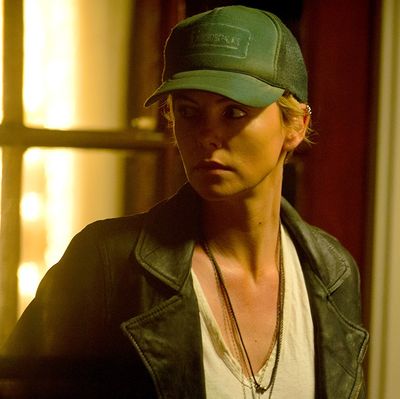
“I have a meanness inside me, real as an organ” are the opening words of narration in Gilles Paquet-Brenner’s Dark Places, adapted from Gillian (Gone Girl) Flynn’s novel. Spoken by Charlize Theron, playing Libby Day, who as a child survived the gruesome murder of most of her family, the words have bite; Theron, as she proved yet again earlier this year in Mad Max: Fury Road, has a natural, irresistible intensity. You believe that she could beat you, then cut you, then spit on you for good measure … and then somehow make you beg for more.
The story unfolds in two timelines. In one, grown-up Libby, having once made her name as “the little orphan girl of the Kansas Prairie Massacre,” is approached by true-crime aficionado Lyle Wirth (Theron’s Fury Road co-star Nicholas Hoult) to talk to his “Kill Club,” a gathering of mystery fiends, and help them reopen the old murder case. They want to exonerate Libby’s brother Ben (played by Tye Sheridan as a teen, and Corey Stoll as an adult), whose imprisonment 28 years ago they believe was “the grossest miscarriage of justice ever.” Libby was 8 back then, but her testimony helped put her beloved brother behind bars, so she’s understandably skeptical about aiding these nerds. But she needs money, and the Kill Club’s paying, so she agrees to help them look into the case.
In the other timeline, we get glimpses of the various events spinning around the Day family right before the murders, back in 1985: Their farm is buckling under debt, and single mother Patty (Mad Men’s Christina Hendricks) is concerned over what will happen to her four kids. Young Ben, meanwhile, is engaging in a healthy bit of teenage Satanism, partly under the influence of his rich, nutty girlfriend Diondra (Chloë Grace Moretz). Did Ben, obsessed with Satan, chop his family up, as alleged? Or was it their estranged, drunken father? Or was it a shady local debt collector? Or someone else?
I haven’t read Flynn’s novel, so I don’t know for sure how closely the film sticks to the original. Much of Libby’s narration feels like Flynn’s voice, though — lyrical, reflective, and cruel — and it adds a touch of poetry to the otherwise by-the-numbers proceedings. There’s nothing particularly wrong with Dark Places: It’s cleanly directed, occasionally atmospheric, and mostly well acted. (Hendricks, in particular, is a standout as the doomed mother, her melancholy helping bathe the flashback scenes in a generalized desperation and grief.) But the film is also curiously lifeless, crammed tightly as it is with plot and structure — which becomes increasingly tedious as it hurtles toward its convoluted and somewhat ridiculous conclusion.
We don’t ever really get to know the Day kids, aside from young Ben. Even Libby, even though she’s the central character of the story, remains a bit of an enigma: In the present day, she’s often a witness, or a listener, reacting to others; in the flashbacks, she’s often a nonentity. We can imagine these characters having some room to breathe on the page and at the expansive length of a novel. But here they barely register. One of the more interesting parts of the story — Lyle and his Kill Club — help set events in motion and then pop up a couple of times, but mostly fade into the background as Libby strikes out on her own. Part of the problem is the interlaced, twin-timeline structure, which ends up diluting the emotional impact of both story threads, instead of enhancing or commenting on them. As a result, the mystery itself eventually becomes tiresome and shrug-worthy, even as the film breathlessly racks up the revelations. In the end, this twisty thriller just winds up twisting in the wind.


